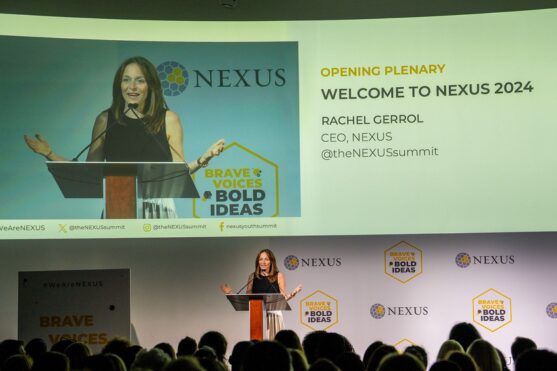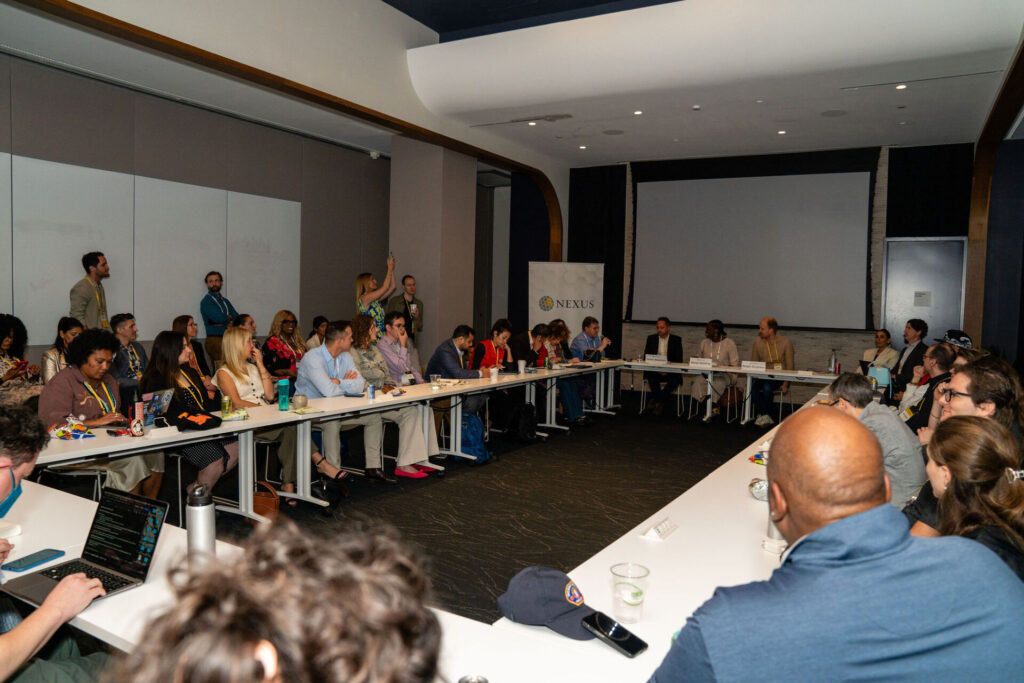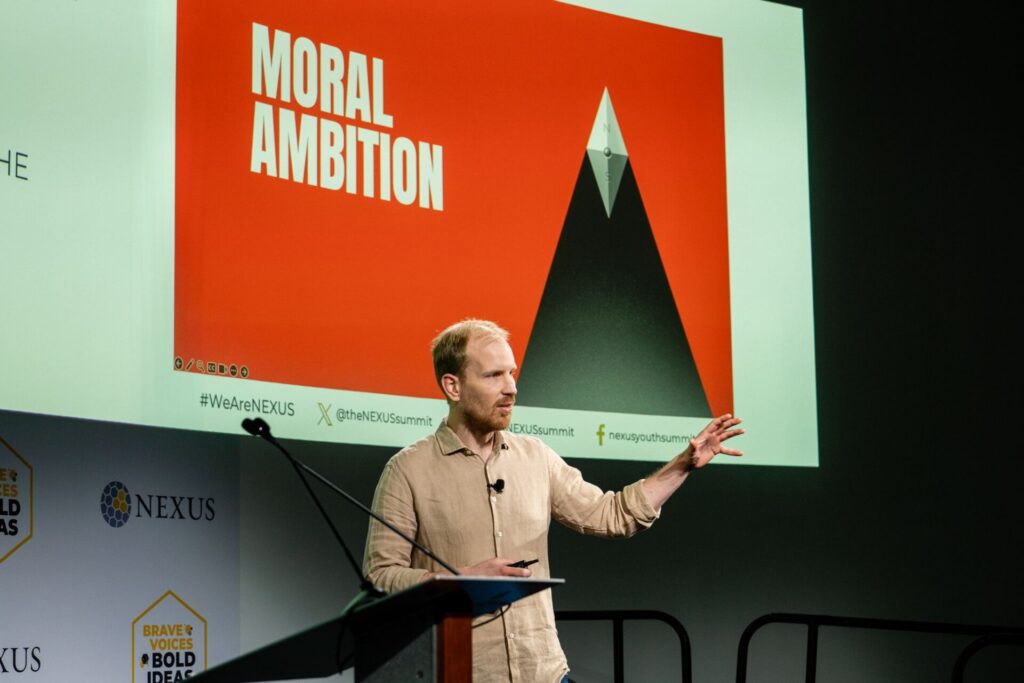What can grantmakers learn from the next generation? Reflections from the NEXUS Global Summit

Bella Conyngham, Philanthropy Australia’s New Gen Network Lead, was part of a 17-strong delegation who travelled to New York for the annual NEXUS Global Summit. Last week, NEXUS Australia Executive Officer Lucy Steggles shared an abundance of key takeaways, which you can read online. Here, Bella shares some thoughts and questions about philanthropy that she’s brought back to Aussie soil from the event.

Attending the NEXUS Global Summit 2024 was a refreshing reminder of the opportunity philanthropy has to enact systemic positive change for communities and Mother Nature.
I sometimes find gatherings like this a little overwhelming in terms of the fanfare and hullabaloo. And sometimes feel uncomfortable wondering whether the resources invested in such events would be better spent supporting the change-makers featured in the keynotes and panel discussions more directly in their mission critical work.
However, I was utterly humbled at just how much I took away from the NEXUS Global Summit. From the ‘ah-ha’ moments, to the thought-provoking debates and moving keynote speakers, it hit me why it is so important to actively engage with new ideas and different viewpoints outside of my professional and personal networks.
We have so much to learn and gain from listening to the perspectives of people on the frontline of social and environmental activism, change and entrepreneurship – those with lived experience of the issues we care about – who are the solution-makers and wisdom holders.
It would be impossible to articulate the many penny-drop moments I experienced, but to give you a flavour of my experience, here are a few insights from my favourite break-out and keynote sessions respectively:
Philanthropy in an age of populism: navigating elections, geopolitics and polarisation
Panellists: Akinyi Ochieng and James Robinson (APCO) and Rutger Bregnan (historian and author).
This standout session explored the role of philanthropy amid rising populism and geopolitical instability. As with many of these types of discussions, I came away with more questions than answers, including:
- Is it OK to be neutral? There’s an important difference between being ‘party political’ (party aligned) vs ‘political’.
- How do we stay proximate to issues? Not only referring to being proximate to communities we’re serving, but also to other key actors in a system, such as government and funding peers.
- How do we actively avoid ‘group think’ and tunnel vision in our sector in a world where the formidable algorithm means the echo chamber effect is more rife than ever?
- Is the desire to be ‘liked’ and ‘trusted’ hindering our progress? One could argue that being bold and taking calculated risks is essential to drive meaningful change, even if it means facing criticism.
- How can the philanthropic sector walk the line between constructively critiquing our dark past and interrogating the perverse outcomes from the way in which so much of the wealth in the sector was generated — and making peace with this in a view to forge ahead and focus on distributing these resources for good?
- Often when fighting for an issue or cause area we act like soldiers (defending a view) but what if we acted like scouts (curious, intellectually humble, adaptable)?
- Grantmakers often think that their theory of change is better than giving directly. The saying ‘don’t give a man a fish, teach him to fish’ could have flaws. What if the man doesn’t like fish or is vegan? This comment articulated the importance of empowering self-determination within the communities grantmakers aim to serve.

Moral ambition: turning ambition into impact, by Rutger Bregman – historian and author
Once a self-described philanthropy skeptic, Bregman shared with his audience that through his research of great social movements such as the suffragettes, abolitionists and civil rights campaigners, he found that most of them were financed philanthropically.
“Companies and governments were never going to give these brave activists any money, because they were simply too controversial. And because companies and governments were making insane amounts of money from these systems of oppression…”. This, he suggests, indicates a continued role for ambitious philanthropy in driving social change. He stressed the importance of learning from history and using those lessons to inform contemporary philanthropic strategies.
Separately but very much related to his findings, Rutger used his keynote to urge the audience to understand societies’ desperate need to address the largest waste of our time – wasted talent. Not ignoring the fact that it’s a privilege to be in a job that algins with your values, I loved the way he articulated the mismatch in talent and what the world needs.
He painted a picture of our current state – one that sees most educated and privileged individuals opting for ‘prestigious’ corporate careers because of the way society has conditioned us to view traditional measures of ‘success’ in our careers – for example the fancy corner office.
In his next breath, we were transported to a world where ‘success’ in our careers was defined by the meaningful and impactful contribution we leave on society. This new definition, Rutger argued, is where we can access a movement of what he calls ‘moral ambition’.
This shift in perspective will encourage jobseekers to view philanthropy and for-purpose work as the most impressive and admired type of labour – therefore enticing more into the sector. This isn’t unlike the Uncharitable message coined by Dan Pallotta.

Workforce for good
Overall, the summit underscored that among the critiques and complexities, there is very much a role for ambitious, effective, community-led philanthropy, especially in areas where governments cannot reach. It reinforced that we are going to need more of the workforce using their time and skills for good. My NEXUS Global Summit experience provided a platform for myriad thought-provoking discussions and innovative ideas, highlighting the potential of philanthropy to address some of the world’s most pressing challenges.
Next on the event circuit is our Philanthropy Australia national conference ‘Shifting Perspectives, Shifting Practice’. I hope to see you there.